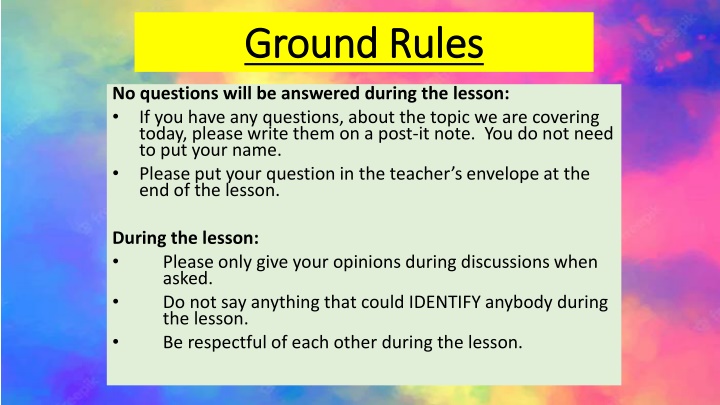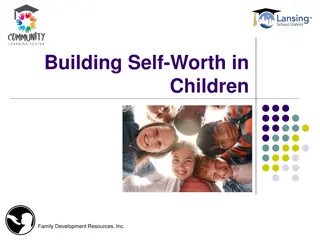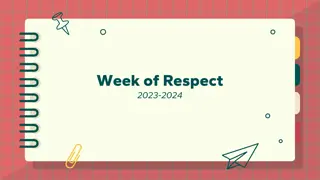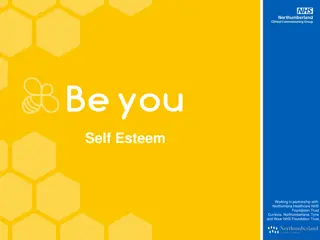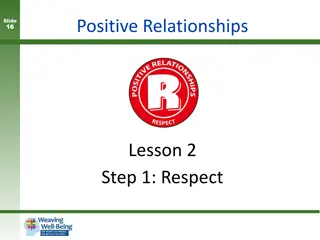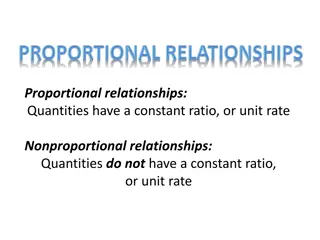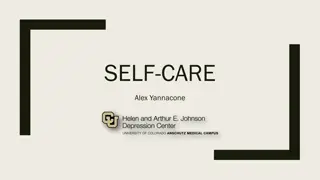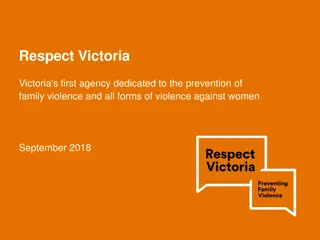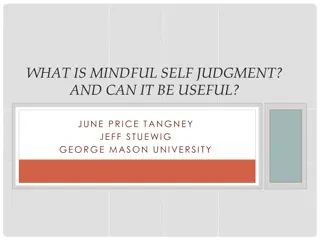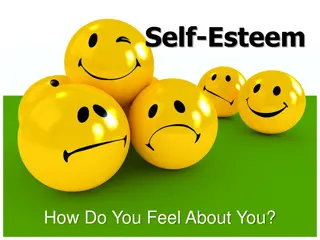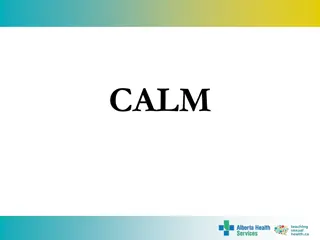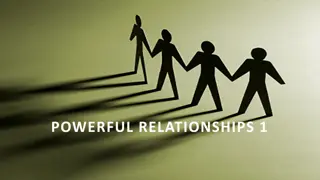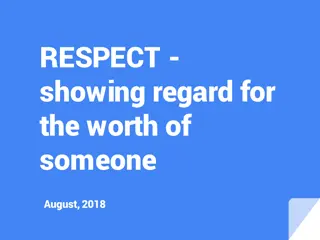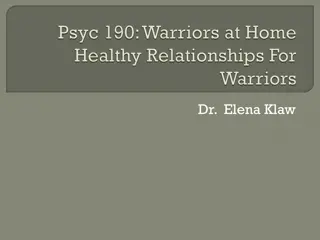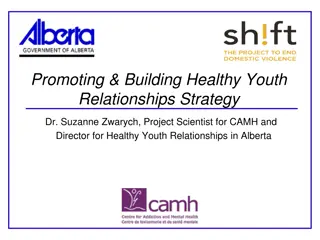Respect and Self-Respect in Relationships
Respect and self-respect are vital elements in any healthy relationship. Understanding the dynamics of healthy and unhealthy relationships, defining respect for oneself, and exploring the concept of self-respect are key steps towards building positive interpersonal interactions. Through discussions, activities, and reflections, individuals can learn to recognize, establish, and maintain respectful relationships while valuing their own worth and boundaries.
Download Presentation

Please find below an Image/Link to download the presentation.
The content on the website is provided AS IS for your information and personal use only. It may not be sold, licensed, or shared on other websites without obtaining consent from the author.If you encounter any issues during the download, it is possible that the publisher has removed the file from their server.
You are allowed to download the files provided on this website for personal or commercial use, subject to the condition that they are used lawfully. All files are the property of their respective owners.
The content on the website is provided AS IS for your information and personal use only. It may not be sold, licensed, or shared on other websites without obtaining consent from the author.
E N D
Presentation Transcript
Ground Rules Ground Rules No questions will be answered during the lesson: If you have any questions, about the topic we are covering today, please write them on a post-it note. You do not need to put your name. Please put your question in the teacher s envelope at the end of the lesson. During the lesson: Please only give your opinions during discussions when asked. Do not say anything that could IDENTIFY anybody during the lesson. Be respectful of each other during the lesson.
Re-cap in pairs can you define these terms? Healthy relationship One night stand Unhealthy relationship Abusive relationship
A healthy relationship = where two people respect each other and both people feel happier because they are in each other s lives. It involves trust, compromise and kindness to each other. One night stand = having sex with someone once when not in a relationship with them. An unhealthy relationship = where two people do not respect each other and they feel overall unhappy being in each other s lives (often there are highs and lows.) An abusive relationship = an unhealthy relationship in which one partner is in control and hurts the other person physically, sexually emotionally and/or financially. Notice that some of these could also link to your relationships with other people too, e.g. family/friends/adults etc.
L.O: How can I have respect for myself in a relationship? Success criteria: You can define the term SELF- RESPECT.
Respect Respect is an important word in the UK. It is one of our British values and one of the main values in the army. But what does it mean? But what does it mean? Discuss. What different types of respect are there? Task On a piece of A4 paper, do a very quick, small sketch of yourself, or something to represent you in the middle of the page and write your full name underneath. Respect for others: >I know and treat others as equally important >I listen to others >I try to have empathy with others >I am polite >I say sorry when I m wrong Now surround with things that define self- respect. Use the list on the left to help you e.g. I know and treat myself as equally important as anyone else.
Self R.E.S.P.E.C.T https://www.youtube.com/watch?v=U0yIf9Tkgu4 After watching this clip discuss: >What is this film about? >Why has it been made in this way? >What s it saying about respect and equality?
What is self-respect? Discuss: (remember don t identify anyone in school etc.) In history, when have people treated others as if they are not equal? Does this still happen in our society? How? Do you think all humans are equal? Think about your own attitude and behaviour for a moment, do you treat people in your life (including school) as equals? Is there anything you d like to change in this area? Consider only discuss if you want: Do you think you are equal to others? Why/why not? Suggestion: I know, and treat myself, as if I am as equally as important as anyone else.
Suggestion: I know there are reasons to like myself. Task: On the sheet write. Reasons to like myself. Make a list of at least five reasons that you are likeable (it can be to do with personality, things you are proud of, appearance.) Optional pass your sheet around the table you are on and add one thing to each persons list.
Discuss: Do you know what the term personal boundaries means? Suggestion: I have personal boundaries. Let s watch this clip to learn more. Personal boundaries: These are the limits and rules we set for ourselves and others within our relationships, e.g. you don t like it when a friend borrows your things without asking so you tell them. Or you decide you are not going to borrow a friend s things without asking. https://www.youtube.com/watch?v=3A_4GCAozVk
What do you think these two famous quotes might mean? We teach others how to treat us. Personal boundaries is how we show love for ourselves.
We are now going to explore some of the different types of personal boundaries that exist. On your A4 sheet write the headings: Personal boundaries. 1) Time boundaries. Consider and discuss are you usually late for school/seeing friends etc? Why might this be disrespectful? What could help you be on time? Are others often late for you? How does it make you feel? What could you say, assertively, to let them know you don t like it?
2) Intellectual boundaries https://www.youtube.com/watch?v=dG5fkAgJmqc Discuss: What do you think it means to DISAGREE RESPECTFULLY? People who do this, can share their beliefs and ideas, but equally listen to others, consider their point of view, and if they disagree do this in a polite and assertive way. Consider are you good at this? How do you know? Could you improve in this area? How? Why might it be important in a career?
3) Emotional boundaries If somebody does, or says, something that brings up strong emotions, such as hurt/anger, they are crossing your emotional boundaries. You may not always choose to say something if it happens once, but if they keep doing it, self-respect would mean telling them you don t like it. Quietly reflect do you allow people to say things to you that hurt and not assertively say anything? How does this make you feel? If they ignore you, when you tell them, is this the sign of a healthy relationship? Do you listen to others if they tell you they are upset by something you are saying/doing? Our emotions/body usually tells us when a boundary has been broken, we may feel upset, angry, confused or even go numb.
4) Physical boundaries What do you think this means? This refers to your privacy and intimate/personal space boundaries. Re-cap what can you remember about privacy from Mrs Parfitt s assembly recently?
Intimate and Personal Space Intimate and personal space = the physical space immediately surrounding someone, into which intrusion can feel uncomfortable or threatening. Personal = about 1m (appropriate same as intimate.) Obviously, this may vary depending on the situation e.g. if your in a music concert. But you always have a right to ask people to stand back assertively, if you feel uncomfortable. Intimate = 0.5m (appropriate lovers/family /close friends.) In what situations may you feel ok about strangers being in your personal space? What can you do/say if you feel uncomfortable? Social = about 3m school/work/ strangers etc. You can use your arm to help work this out.
5) Sexual boundaries Re-cap: when someone is below the age of 13 years old, any sexual contact is illegal and would lead to prison/criminal record. People aged 13, 14, 15 years old are able to physically touch, but oral sex or full sex are not legally allowed until 16 years old. This is to protect people they consider are not old enough to give consent. If you are worried about yourself, or anyone else s sexual boundaries being violated, tell an adult that you trust in school and they will support you. If someone is at immediate risk you are allowed to also call 999. If not at immediate risk you can call 101.
For your own wellbeing, it is important to consider as you are getting older, what will your own sexual boundaries be? >How do you know you are ready for sex? >How do you tell someone this? >What do you do if they ignore you? >How do you know if someone else is ready for sex? >What does safe sex mean for you? >What do you need to know before having sex e.g. are you in a committed relationship? >What things are you not happy to do? How do you say this? >What things make you happy? Next week we will explore this more.
Learning check: What does the term SELF-RESPECT mean?
Ext (if time.) To help you work out your own personal boundaries make a list of the following. What I expect from a good friend: What I expect from a good boy/girlfriend/partner:
